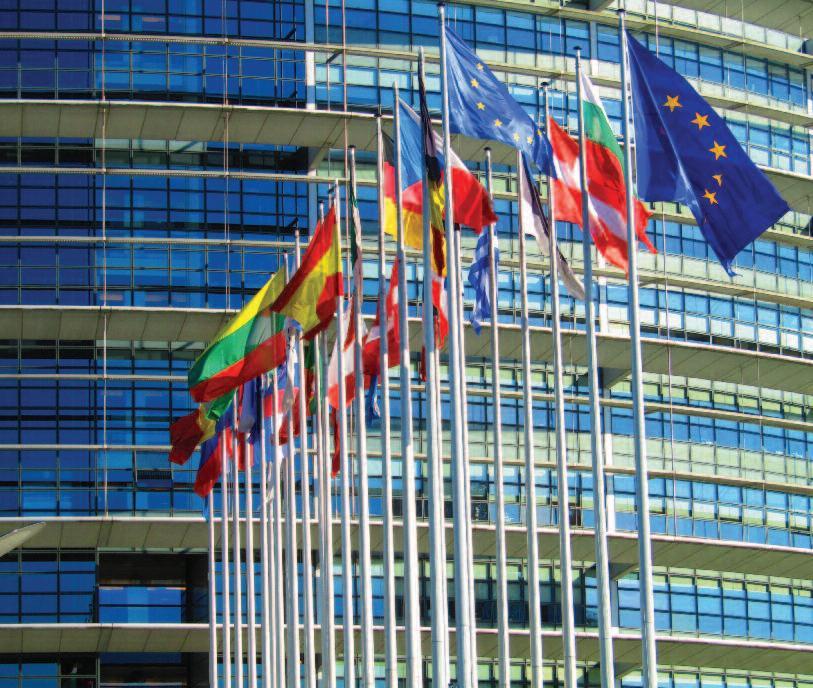
13 minute read
The Northern Ireland Protocol – A Current Review by Larry Plachno
from NBT The Magazine of Bus Equipment for the United States and Canada Vol XLIV, No. 10 September, 2021
Regular readers will remember that we included articles on the Northern Ireland Protocol in both the February and May issues earlier this year. The latest development is the request by the United Kingdom to renegotiate the Protocol. As a result, the questions and communications have been taking a great deal of our time so it might be a good idea to revisit this topic.
There are two reasons why this situation can be difficult to follow. The first is that there is too much politics involved. You frequently hear the equivalent of “Our side is always right and the other side is always wrong. ” If a politician happened to walk on water, the opposition party would accuse him of not knowing how to swim. The second problem is that virtually all of the countries and groups involved are making statements and taking positions for their own benefit, often at the expense of other countries or groups. Before you consider a news report or comment, you first need to figure out where the speaker or writer stands.
Advertisement
Hence, two things are happening. There has not been a lot of cooperation and looking at the practical side of things. This has increased animosities and bad feelings between many of those involved and only made things worse for finding solutions. In addition, this has made it increasingly difficult for an outsider to follow what is going on and what is actually meaningful. As a result, I am going to try to go through the more important points on all of this for any readers who want to take the time to follow along.
Brexit
Brexit is a simplified form or contraction for “British Exit” – the United Kingdom (UK) vote to leave the European Union (EU). In retrospect, the UK was always somewhat of an uneasy member of the EU. The UK applied for membership in 1963 and 1967 but were turned down both times. They were finally admitted in 1973. Two years later, the UK voted on whether to remain in the EU and that vote was positive. However, in 1979 the UK decided not to use Euros and instead stay with their traditional Pounds Sterling, reportedly the oldest monetary system still existing.
In 2016 the UK voted to “remain” or “leave” the EU. Approximately 1.9 percent more voters decided to leave rather than remain. Since the margin is so small for those who were dissatisfied, people have asked whether Brexit could have been averted had the British leadership or even the EU stepped in to correct the reasons why some voters wanted to leave. There were complaints about more money being spent in London than in the rural areas as well as concerns over the National Health Service. None of these could be attributed to the EU to any extent. Other complaints included EU countries fishing in UK waters and EU immigrants not assimilating. Could British leaders have brought these concerns before the EU in order to prevent Brexit? Of course, the next question would be whether the EU was willing to take action or not. Unfortunately, things turned political instead of practical.
The Northern Ireland Protocol
A Current Review
by Larry Plachno
Brexit – the United Kingdom leaving the European Union, caused numerous changes in the relationship between the UK and the EU. One of the more important items was the establishment of a customs border to separate the two. This has increasingly become a concern as difficulties have come up with the original arrangement. PIXABAY.
Geography
All of this activity is taking place on two large islands to the west of Continental Europe. The larger of the two islands, and the one closer to Continental Europe, is called Great Britain and includes England, Wales and Scotland. Located further west is the island of Ireland that includes the Republic of Ireland and Northern Ireland. Today, England, Wales, Scotland and Northern Ireland constitute the United Kingdom.
At one point both islands were part of the United Kingdom. In 1922, the southern and central portions of the island of Ireland broke away and formed what is today the Republic of Ireland. Six remaining counties in the northeastern part of the island became Northern Ireland.
What has become a major problem is that the residents of Northern Ireland are a mixed group of Irish and British people. The Irish relate to the Republic of Ireland while the British relate to the United Kingdom. The two groups do not mix well. Some people suggest that this may be a religious difference but since some Irish are Protestant and some British are Catholic, the distinction seems to follow national rather than religious differences.
Until Brexit, both the Republic of Ireland and Northern Ireland were in the European Union and hence their 310-mile land border was essentially open. There still were major problems and confrontations with paramilitary groups. As many as 3,600 died in conflicts that came to be called “The Troubles. ” This was finally resolved in 1998 with what became known as the Good Friday agreement that created an uneasy peace by balancing the two sides. The three parts of the Good Friday agreement included the northsouth border to Ireland, the east-west border to the UK and a partnership government for Northern Ireland. Today, residents of Northern Ireland are in an unusual situation in that they can claim Irish citizenship, British citizenship or both.
Because of this situation, establishing a border following Brexit has been a major problem. The actual Brexit vote saw both England and Wales voting to leave the EU while Northern Ireland voted to remain and Scotland voted strongly to remain. In a following newspaper poll, Northern Ireland also indicated that they did not want borders. Logically, the customs border between the EU and the UK should be along the 310-mile land border between the Republic of Ireland, that remains in the EU, and Northern Ireland that is part of the UK. Both the Republic of Ireland and the Irish people in Northern Ireland do not want a border here. At the same time, the British people as well as many merchants and businesses in Northern Ireland do not want a border with the rest of the UK.
It probably can be said that almost no one in Northern Ireland really wants a customs border. The need for a customs border comes from the EU because they want to protect their Single Market.
Exit Plan
While the Brexit vote took place in 2016, movement languished because of inactivity on the part of the UK government. Even when it finally moved ahead, the proposal of then Prime Minister Theresa May failed to pass Parliament three times. With her resignation, Boris Johnson stepped in as prime minister and then won an election that was an obvious mandate from the citizens to get Brexit done.
Prime Minister Johnson and his staff had to negotiate an exit plan that was acceptable to the European Union. There were several major items on the table including fishing rights, subsidies for companies that might impact trade and numerous other things like communications, transportation, police cooperation, etc. Several people commented that the EU was not being kind to the UK because they did not want the UK to come out ahead and hence prompt other countries to leave the EU.
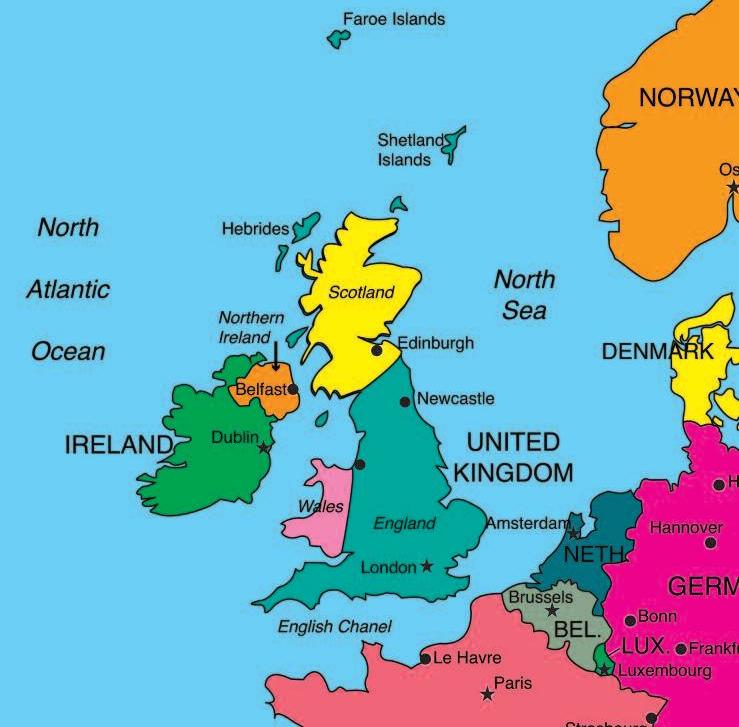
All of this activity takes place on two large islands to the west of Continental Europe. The first island, Great Britain, includes england, Wales and Scotland, all part of the UK. The adjacent island, Ireland, includes the Republic of Ireland that is part of the EU and Northern Ireland that is part of the UK. Logically, the customs border should go along the 310-mile border between the Republic of Ireland and Northern Ireland where the EU and UK meet. NBT.
The people of Northern Ireland are substantially opposed to a customs border. The Irish do not want a border on the Irish side while the British do not want a border on the British side. This is complicated by the Good Friday agreement of 1998 that stipulated that the two sides should be treated equally. SEIN FÉIN, WIKICOMMONS
(HTTPS://CREATIVECOMMONS.ORG/LICENSES/BY/2.0/DEED.EN)
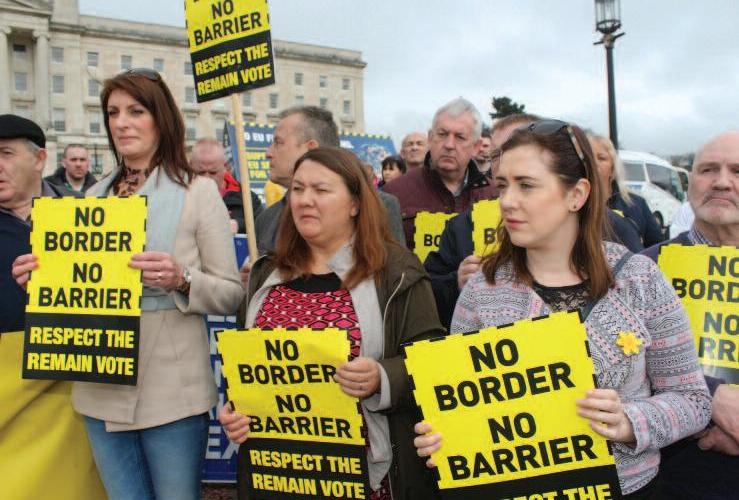
This has become highly political with opposition parties chastising Johnson for the Northern Ireland Protocol that resulted. This may be at least partially unfair since the plan had to be approved by the EU and they insisted on a strong customs border to protect their Single Market. Hence, Johnson and his staff were not given substantial leeway in alternatives. What resulted was a customs border in the Irish Sea separating Northern Ireland from the rest of the United Kingdom. There would be no customs border between Northern Ireland and the Republic of Ireland while Northern Ireland would adhere to EU standards to keep this border open.
At that time, Johnson hailed the Protocol as a great success and promised that there would be no paperwork for items moving to Northern Ireland from the rest of the UK. There would be justification for criticizing Johnson for making this statement. However, from its inception many people doubted that such a remote customs border was practical or workable. There is no example of anything similar being successful anywhere else. More recently, there have been suggestions that Johnson and his staff may have agreed to the Irish Sea customs border in order to get EU approval and “get Brexit done. ” There were thoughts that the Protocol could be revisited and changed later.
It is noteworthy that these negotiations took place primarily between the EU, the UK and the Republic of Ireland. The people most affected by the Protocol – the British, merchants, business people and residents of Northern Ireland – were not given much input. What did emerge from the agreement is a strange provision that Northern Ireland would be given a chance to vote on the Protocol in 2024, and perhaps later, but not currently.
The Protocol
As many people predicted, the Northern Ireland Protocol did not work well from the start. Some of the more obvious problems included the following: • In order to protect customs and the EU Single Market on shipments going to the Republic of Ireland, all shipments crossing the Irish Sea – including those only going to Northern Ireland – had to comply with customs regulations and paperwork. This has proven to be a monumental task. Sources suggest that for every shipment going to Ireland, where customs would be logical, five or six items going to Northern Ireland must face the same paperwork and regulations which had not been required previously. • Stores and supermarkets in Northern Ireland have had empty shelves because of the difficulty in getting things from the rest of the UK to Northern Ireland. • There are numerous problems in getting medicine into Northern Ireland both because of customs and because UK medicines do not comply with EU requirements. • Numerous suppliers and shippers located in the UK have given up trying to supply Northern Ireland with food and other products because of the paperwork and regulations. • Some people in Northern Ireland say that a border here is not fair since they voted “remain” and no borders. It should be the people who voted “leave” that have the border. • The British people in Northern Ireland have felt rejected. They do not like the border between them and the remainder of the UK. In addition, the Protocol is upsetting the balance between the Irish and British in North-
Boris Johnson is interested in buses and reportedly even has a model bus collection. When mayor of London, he was instrumental in reviving interest in London’s traditional big red double-deck buses. Here he is shown doing a test drive at the WrightBus plant in Ballymena, Northern Ireland.
WRIGHTBUS.
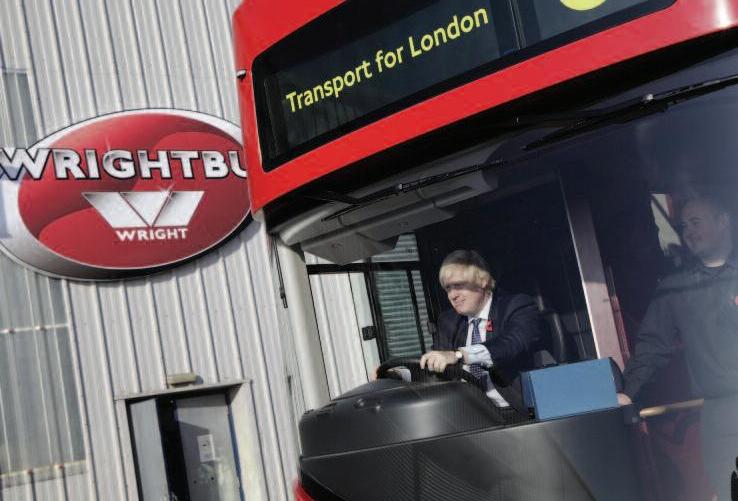
The Education Authority in Northern Ireland recently took delivery of 15 new buses form Alexander Dennis. They incorporate Plaxton Leopard bodies on Volvo B8R chassis, are painted yellow and will seat 57 and 72 passengers. They are used in school services across Northern Ireland. ALEXANDER
DENNIS.
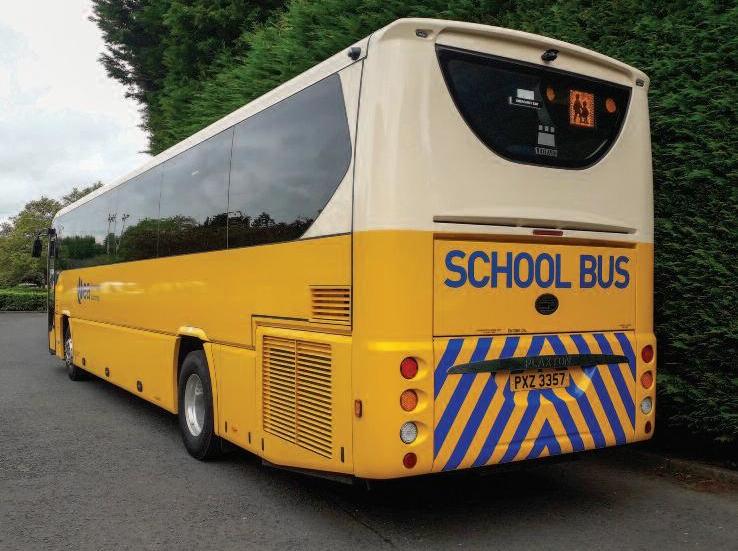
VDL recently delivered 30 Futura FHD2139 coaches to Bus Éireann in Ireland. They were bult for public transport and have route indicators, a camera system, WiFi and a contactless payment system. They will be used on routes for Expressway interregional services. VDL.
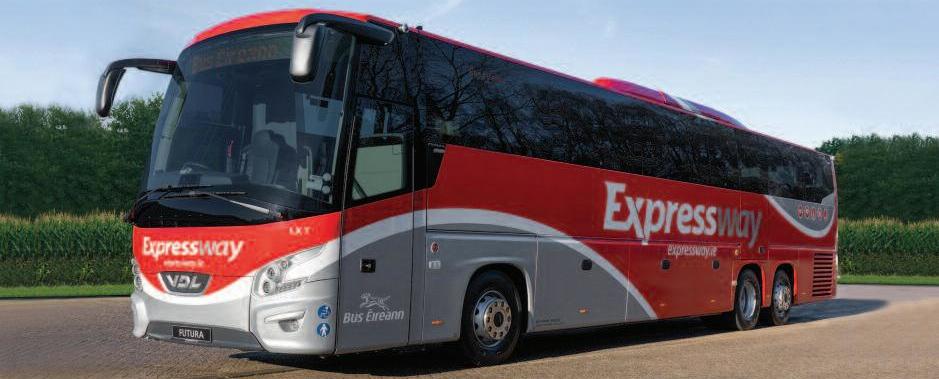
ern Ireland that was supposedly guaranteed by the Good Friday agreement. • There has been violence in the streets of Northern Ireland, although thankfully no deaths yet. However, there is the possibility of a return to past violence because of the Protocol. • There are also indications that the Protocol is causing a disruption in the shared government in Northern Ireland.
Because of these problems, the UK took unilateral action to postpone some of the Protocol requirements. This brought objections from the EU with threats of legal action and a possible trade war. More recently, there was a problem with certain meat products crossing the Irish Sea that came to be called the “Sausage War. ” The UK announced that the Protocol would have to be renegotiated because it was unsustainable and causing substantial damage and problems for Northern Ireland. As of this writing, this is the current status of the Protocol. Alternatives
The problem with this is that there is no way to please everyone. The EU wants a strong customs border to protect its Single Market. In general, the people of Northern Ireland do not want a customs border. The British, the shopkeepers and the business people of Northern Ireland and suppliers in the rest of the UK do not want a customs border in the Irish Sea. Meanwhile, some of the political leaders in Northern Ireland are calling for scrapping the Protocol. So what alternatives are there?
While there may not be any objection to a customs border for shipments going to the Republic of Ireland, any paperwork or customs on shipments from the rest of the UK to Northern Ireland seem to be a major problem. There have been proposals on refunds on items going only to Northern Ireland, but it appears that any paperwork would still be a problem. In addition, there are problems with medicines, pets, animals and various food items meeting EU instead of UK requirements. If there was a way to separate the Irish from the Northern Ireland shipments, that would be a start in the right direction.
The EU appears to be willing to leave the 310-mile border between the Republic of Ireland and Northern Ireland open. Although this would obviously allow anything from Northern Ireland to pass into the Republic of Ireland and the EU regardless of whether it met EU requirements or not.
All we can do at this point is to hope that cooler heads prevail in the future and that politics and national differences are put aside so everyone can work together for a solution. My guess is that if the 2024 Northern Ireland vote on a customs border were held today, the result would be negative. q
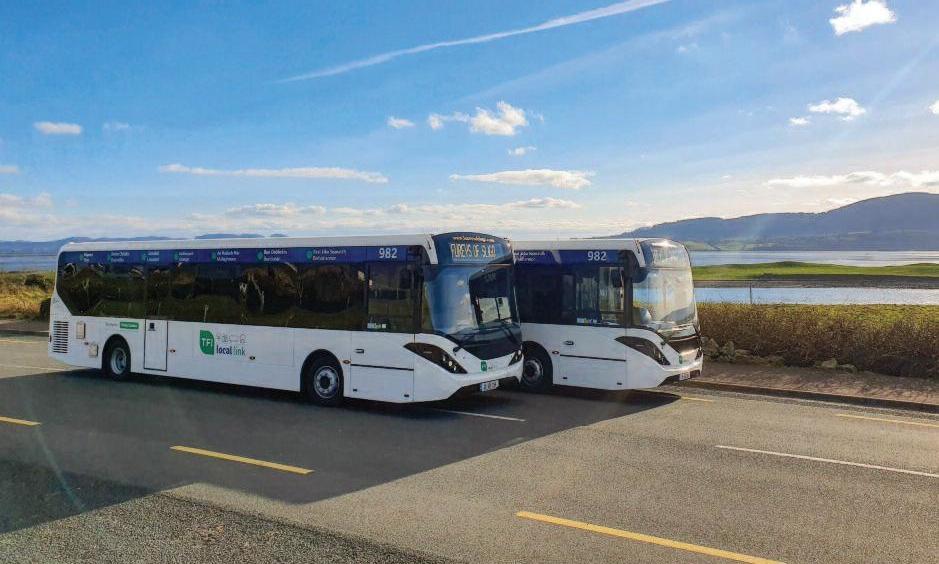
Irish bus operator Furey’s of Sligo recently took delivery of two Alexander Dennis Enviro200 buses. They are about 35 feet long and accommodate up to 41 passengers. Furey’s will use them on a National Transport Authority route from Sligo north to Ballyshannon, which is just west of Northern Ireland. ALEXAN-
DER DENNIS.




